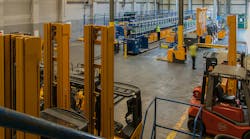Nearly every day, we’re inundated with fear-mongering reports of crisis, collapse, meltdown and references to the Great Depression.
We’re oddly attracted to this gloom and doom just as we’re compelled to slow down on the highway to eyeball a mangled wreck. We enjoy the rush of feeling horrified while sitting safe in our heated seats. It makes our mundane existence seem exciting, especially when the disaster is someone else’s problem.
But, clinging to this same pessimism in a business environment is different. There are no safe seats. Negativity travels like a virus, infecting all levels of an organization. Symptoms include reduced productivity, absenteeism, even theft and violence.
Business pessimism can result in something even worse: inaction. Doomsday thinking says we are victims, powerless to resist the whims of the stock market or consumers. It’s not our fault mammoth institutions have been reduced to beggars. It’s not our fault consumers and lenders are slamming their wallets shut.
It’s easier that way. No need to challenge the status quo. A few cuts here and there, and all will be fine. Never mind the fact that knee-jerk, indiscriminate cost cutting often does more harm than good.
I sat down with John Nofsinger, CEO of the Material Handling Industry of America, for some straight talk about the state of material handling and logistics. Nofsinger told me businesses that sell or purchase material handling equipment regularly go through economic cycles, with major downturns typically appearing at the start of decades. “The point is,” he said, “this is not unexpected. Most were hunkered down and prepared, so it wasn’t catastrophic. The issue of credit is extending the downturn forward, probably into 2010,” Nofsinger acknowledged. “But, by the fourth quarter of 2009, people will start to see order books picking up.”
Nofsinger warned that the darkness of the moment can make us forget more positive, long-term growth trends. “It masks a bit what’s really going on because we are in this half-empty mindset,” he said. “As traumatic as 2008 has been, it represents the natural resetting of our capital economy.”
He added that this is a perfect time for companies to dust off creative projects they were too busy to implement when times were good.
So, maybe it’s not whistling past the graveyard to suggest this is the best time for innovation—the creative process that supports competitive advantage and operational resiliency. And, remember, some of the best innovations come from the trenches, not ivory towers.
Still, change is like quicksand. The more you struggle against it, the deeper you sink. Moving past fear takes courage but leads to prosperity. “For those with the vision and fire in their bellies,” Nofsinger said, “there are exciting times forward.”
Mary Aichlmayr, Editor in Chief
[email protected]




